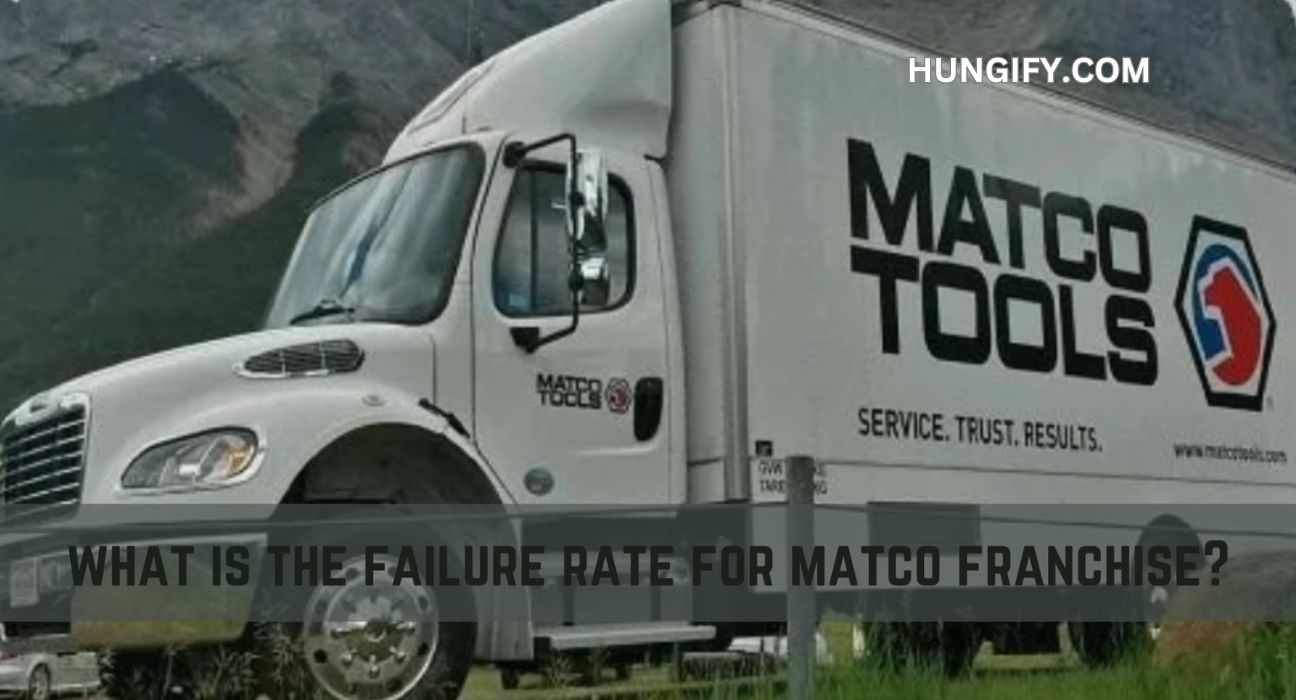Introduction
When considering a franchise opportunity like Matco Tools, understanding the failure rate is crucial. The failure rate for Matco franchise sheds light on the challenges and risks associated with the business. This knowledge can guide potential investors in making informed decisions and preparing for the realities of franchise ownership.
Read More: Sharda iCloud: Your Comprehensive Guide to Academic Success
Breaking Down the Failure Rate for Matco Franchise
The term “failure rate” refers to the percentage of franchise units that cease operations within a specified period. For Matco franchise, understanding this failure rate involves examining various factors, including financial challenges, market dynamics, and franchisee preparedness. Although exact figures can vary, the failure rate for Matco franchises typically falls within the industry standard of 5-10%.
Key Drivers of Matco Franchise Failures
Inadequate Financial Planning
One of the most common reasons for the failure rate in Matco franchise is insufficient financial planning. Franchisees often underestimate the ongoing costs of running the business, such as inventory replenishment, marketing, and employee salaries. Without a solid financial strategy, franchisees may struggle to maintain profitability.
Market Conditions and Competitive Landscape
The competitive nature of the automotive tools market plays a significant role in the Matco franchise failure rate. In regions where the market is saturated with similar offerings from competitors like Snap-on and Mac Tools, new Matco franchisees may find it challenging to secure a foothold. This competition can lead to lower sales and increased financial pressure.
Operational Challenges and Management Issues
Effective management is crucial for the success of any franchise. The failure rate for Matco franchise can be attributed to operational inefficiencies, such as poor inventory management, lack of customer service focus, or failure to adapt to local market needs. Franchisees who lack experience in business operations may find it difficult to navigate these challenges.
Franchisee-Franchisor Relationship
The relationship between the franchisee and franchisor is a critical factor in the success or failure of a franchise. The failure rate for Matco franchise can sometimes be linked to inadequate support from the franchisor, whether it’s insufficient training, lack of marketing assistance, or poor communication. A strong, supportive relationship can significantly reduce the risk of failure.
Real-World Examples: Successes and Failures
Case Study 1: A Success Story
Consider a Matco franchisee who strategically chose a location with a high demand for automotive tools and services. By focusing on exceptional customer service and leveraging local marketing, this franchisee was able to build a loyal customer base, resulting in consistent revenue and business growth. This success story highlights the importance of market research and customer engagement.
Case Study 2: A Failure Example
In contrast, another Matco franchisee faced challenges due to poor location selection and inadequate financial reserves. The business struggled to attract customers and manage operational costs, leading to eventual closure. This case underscores the need for thorough planning and financial preparedness to avoid contributing to the Matco franchise failure rate.
Mitigating the Risks: How to Succeed with a Matco Franchise
Choosing the Right Location
Selecting a prime location is critical for reducing the risk of failure. Franchisees should conduct extensive market research to identify areas with high demand for automotive tools and minimal competition. A well-chosen location can significantly boost customer acquisition and retention.
Developing a Robust Financial Plan
A detailed financial plan is essential for sustaining a Matco franchise. Franchisees should budget for both expected and unexpected expenses, ensuring they have sufficient capital to weather financial challenges. Regular financial reviews and adjustments can help maintain business stability.
Leveraging Franchisor Resources
Matco offers various resources to support its franchisees, including training, marketing tools, and operational guidance. Franchisees should actively engage with these resources to enhance their business operations and reduce the likelihood of failure.
Focusing on Customer Relationships
Building strong relationships with customers is key to long-term success. Franchisees should prioritize customer service, create loyalty programs, and engage with the local community to foster customer loyalty. Satisfied customers are more likely to return and recommend the business to others, driving sustained growth.

Evaluating Your Readiness for a Matco Franchise
Assessing Personal Skills and Experience
Before investing in a Matco franchise, potential franchisees should evaluate their skills and experience in business management, sales, and customer service. Those who possess strong business acumen and a willingness to learn are better positioned to succeed.
Understanding the Commitment Required
Owning a franchise requires a significant time and effort commitment. Franchisees should be prepared to invest long hours, particularly during the initial stages of the business. Understanding and accepting this commitment is crucial for avoiding burnout and ensuring long-term success.
Seeking Advice from Industry Experts
Consulting with current franchisees, business advisors, and industry experts can provide valuable insights into the realities of owning a Matco franchise. Their advice can help potential investors make informed decisions and avoid common pitfalls.
Matco Franchise Failure Rate: Finding the Numbers
Unfortunately, obtaining specific data on the Matco franchise failure rate can be challenging. Publicly available information on franchise failure rates is often limited, making it difficult to pinpoint the exact percentage for Matco franchises.
However, focusing solely on a specific failure rate number might not be the most productive approach.
Looking Beyond Specific Numbers: Factors Affecting Your Success
Several factors beyond a general Matco franchise failure rate can significantly impact your individual success as a franchisee. Here are some key considerations:
- Market Saturation and Competition: The density of existing automotive tool stores and repair shops in your target market can influence your customer base and sales potential.
- Franchisee Management Skills and Experience: Strong business management skills, sales experience, and a customer-centric approach are crucial for running a successful franchise.
- Location and Customer Base: Selecting a strategic location with a strong concentration of mechanics and automotive enthusiasts will directly impact your sales and profitability.
Strategies to Increase Your Odds of Success as a Matco Franchisee
While there’s no guaranteed formula for success, several strategies can increase your odds of thriving as a Matco franchisee:
- Thorough Due Diligence and Market Research: Conducting in-depth research on the local market, competition, and potential customer base is critical before investing.
- Building Strong Relationships with Customers: Providing excellent customer service, building trust, and establishing strong relationships with local mechanics are essential for repeat business.
- Understanding the Financial Investment and Ongoing Costs: Clearly understand the initial franchise fee, ongoing royalty payments, and other operational expenses involved.
- Utilizing Matco Franchise Support and Training Programs: Take full advantage of the training and support offered by Matco to develop the skills and knowledge needed to run your franchise effectively.
Alternatives to Owning a Matco Franchise
If, after considering the Matco franchise failure rate and the factors affecting success, you’re unsure about Matco ownership, explore other options:
- Exploring Other Franchise Opportunities in the Automotive Industry: Consider franchises focused on specific automotive segments or offering different product lines.
- Considering Alternative Business Ownership Models: Evaluate alternative business ownership models that might better suit your skills, interests, and risk tolerance.
Conclusion
Owning a Matco franchise can be a rewarding experience, offering the benefits of brand recognition, established systems, and ongoing support.
However, it’s crucial to understand the potential challenges associated with franchise ownership, including the broader small business failure rate and the specific factors affecting your success as a Matco franchisee.
By carefully evaluating all aspects of Matco franchise ownership, conducting thorough research, and implementing strategies for success, you can increase your chances of building a thriving business.
Read More: Matco Franchise Failure Rate: Key Insights and Factors
Frequently Asked Questions
What factors contribute most to the failure rate of Matco franchises?
- The main factors include poor financial management, market competition, inadequate location, and lack of business experience.
How does Matco’s failure rate compare to other tool franchises?
- Matco’s failure rate is similar to other tool franchises, generally falling within the industry average of 5-10%.
Why is understanding the failure rate important before investing in a Matco franchise?
- Understanding the failure rate helps potential franchisees assess risks, prepare better, and make informed investment decisions.
What can I do to reduce the chances of failure with a Matco franchise?
- You can reduce the risk by conducting thorough market research, choosing a good location, and following the franchisor’s guidance.
Is the failure rate for Matco franchise higher in certain regions?
- The failure rate may vary by region, often depending on market saturation, economic conditions, and local demand for automotive tools.
How long does it typically take for a Matco franchise to become profitable?
- Profitability timelines vary, but successful franchises often see profits within the first 1-3 years, depending on market conditions and management.
What are the warning signs that a Matco franchise might fail?
- Warning signs include declining sales, cash flow issues, poor customer retention, and lack of support from the franchisor.
Can previous business experience reduce the risk of failure in a Matco franchise?
- Yes, having previous business experience, especially in sales and management, significantly reduces the risk of franchise failure.
What role does franchisee support from Matco play in the failure rate?
- Strong franchisee support from Matco can help mitigate the risk of failure by providing training, marketing, and operational guidance.
Are there specific challenges new Matco franchisees face that contribute to failures?
- New franchisees often struggle with high initial costs, market competition, and managing operations effectively, which can lead to failure if not properly addressed.
